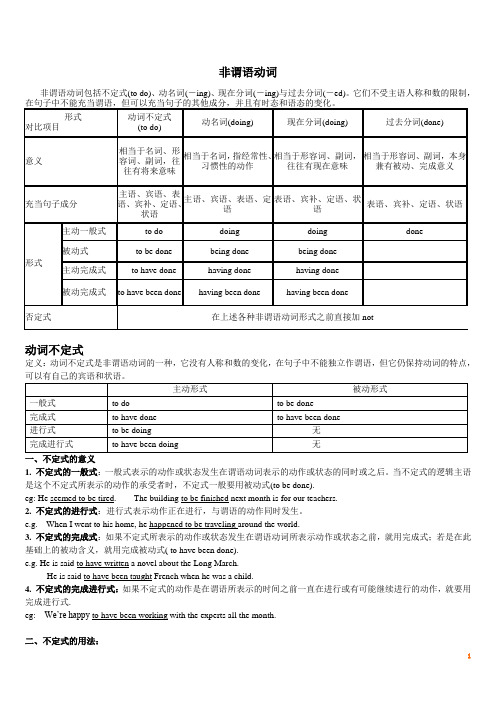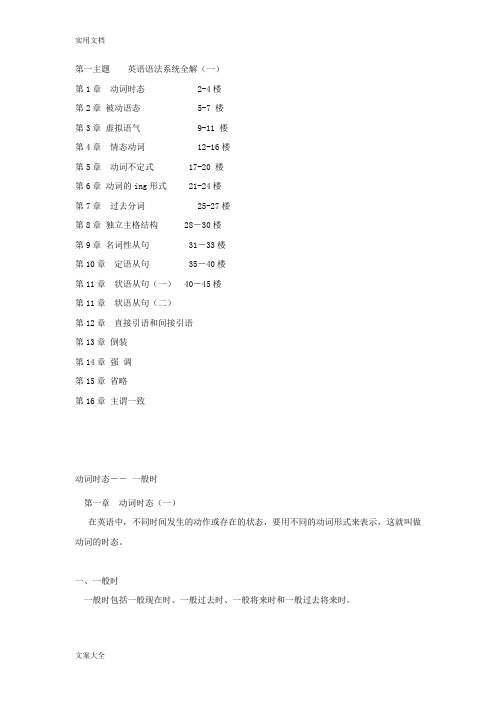高中英语语法大全【精讲教程】
高中英语语法复习讲义+训练:动词不定式

高中英语语法复习讲义——动词不定式一.相关知识点精讲:1. 不定式作补语1) 有些有动词+宾语+不定式的结构。
例如:例如;Father will not allow us to play on the street. 父亲不让我们在街上玩耍。
The officer ordered his men to fire. 长官命令士兵开火。
注意:有些动词如make,have,get,want等可用不定式作做宾补,也可用分词作宾补。
现在分词表达主动,也表达正在进行,过去分词表达被动。
2) 有些有动词+宾语+不定式的结构,不定式的动词往往是be ,不定式一般可以省去。
例如:例如:We believe him to be guilty. 我们相信他是有罪的。
We know him to be a fool. 我们知道他是个笨蛋。
(to be 不能省去) 典型例题Charles Babbage is generally considered___ the first computer. A. to inventB. inventing C. to have invented D. having invented 答案:C. 一般没有consider+宾语+be 以外不定式的结构,也没有consider+宾语+doing 的结构,排除A 、B、D 。
consider 用动词be 以外的不定式作宾补时,一般要求用不定式的完成式,故选C 。
3) 有些动词可以跟there +to be 的结构。
例如:例如:We didn't expect there to be so many people there. 我们没料到会有那么多人在那里。
You wouldn’t want there to be another war. 你不至于想让另外一场战争发生吧。
2. 不定式作主语不定式作主语,往往用it作形式主语,真正的主语不定式放至句子的后面。
高中英语语法专项精讲-非谓语动词讲解

非谓语动词非谓语动词包括不定式(to do)、动名词(-ing)、现在分词(-ing)与过去分词(-ed)。
它们不受主语人称和数的限制,动词不定式定义:动词不定式是非谓语动词的一种,它没有人称和数的变化,在句子中不能独立作谓语,但它仍保持动词的特点,一、不定式的意义1. 不定式的一般式:一般式表示的动作或状态发生在谓语动词表示的动作或状态的同时或之后。
当不定式的逻辑主语是这个不定式所表示的动作的承受者时,不定式一般要用被动式(to be done).eg: He seemed to be tired. The building to be finished next month is for our teachers.2. 不定式的进行式:进行式表示动作正在进行,与谓语的动作同时发生。
e.g. When I went to his home, he happened to be traveling around the world.3. 不定式的完成式:如果不定式所表示的动作或状态发生在谓语动词所表示动作或状态之前,就用完成式;若是在此基础上的被动含义,就用完成被动式( to have been done).e.g. He is said to have written a novel about the Long March.He is said to have been taught French when he was a child.4. 不定式的完成进行式:如果不定式的动作是在谓语所表示的时间之前一直在进行或有可能继续进行的动作,就要用完成进行式.eg: We’re happy to have been working with the experts all the month.二、不定式的用法:1. 不定式做主语:不定式做主语一般表示具体的某次动作。
而动名词doing 表示习惯的,经常的动作。
高中英语语法大全全课件非常详细(561张PPT)PPT课件

Two teas, please. 请来两杯茶。
d. 抽象名词有时也可数。
four freedoms 四大自由
the four modernizations 四个现代化
many interests 许多兴趣
精选PPT课件
15
精选PPT课件
16
问题1
The ______ is just around the corner and you won’t miss it. (01北京春季)
有些抽象名词和物质名词也可转化为可数名词,用
来表示某种特定的意义。a knowledge of …表示
“对……有所了解“。又如:
This meeting is a great success.
请看下面的可数与不可数名词的转化:Βιβλιοθήκη 精选PPT课件14
a. 当物质名词转化为个体名词时。
Cake is a kind of food. 蛋糕是一种食物。 (U)
A. a four hour C. a four-hours
B. a four hour's
✓D. a four hours'
精选PPT课件
18
问题3: There are only twelve _____ in the hospital.
✓ A.woman doctors B.women doctors
大多数不可数名词都不可能转化为可数名词,常
见的有:information; news; advice; progress;
fun ……如:
This is not a match. We’re playing chess for _____.
✓ A habit B hobby C fun D game (2001上海春季)
高中英语语法精讲-九大英语句子成份构成

Whether he’ll join us in the discussion is of great importance . 他是否参加我们的讨论是很重要的。 8. It 作形式主语 It is dangerous playing with fire . 玩火是危险的。 It is a pity that he cannot swim . 他不会游泳真是遗憾。
—I have five . 我有5本。 4. 名词化的形容词或分词 They helped the old with their housework yesterday . 他们昨天帮助老年人做家务。 We should take the wounded to the hospital immediately . 我们应该立刻把伤员送进医院。 5. 不定式(短语) He pretended not to see me . 他假装没有看见我。
The company sent us a few computers last year. 公司去年给我们送了几台计算机。 He sent a birthday gift to me yesterday. 昨天他送给我一份生日礼物。 3. 复合宾语 有些动词除了接宾语外,还需要一个词 来说明宾语的身份或状态,以补充其意 义的不足,这样的词或短语叫做宾语补 足语。宾语和宾语补足语一超组成复合 宾语,它们在逻辑上有主谓关糸。如果
He is against our plan . 他反对我们的计划。 9. 副词 Time is up . The class is over . 时间到了,下课。 My father isn’t in . He is out . 我父亲不在家,他出去了。 10. 表语从句 The truth is that he’s never been abroad . 事实是他从未出过国。
高中英语语法大全(详细)

第一主题英语语法系统全解(一)第1章动词时态 2-4楼第2章被动语态 5-7 楼第3章虚拟语气 9-11 楼第4章情态动词 12-16楼第5章动词不定式 17-20 楼第6章动词的ing形式 21-24楼第7章过去分词 25-27楼第8章独立主格结构 28-30楼第9章名词性从句 31-33楼第10章定语从句 35-40楼第11章状语从句(一) 40-45楼第11章状语从句(二)第12章直接引语和间接引语第13章倒装第14章强调第15章省略第16章主谓一致动词时态--一般时第一章动词时态(一)在英语中,不同时间发生的动作或存在的状态,要用不同的动词形式来表示,这就叫做动词的时态。
一、一般时一般时包括一般现在时、一般过去时、一般将来时和一般过去将来时。
A.一般现在时1.一般现在时的构成一般现在时主要用动词原形来表示。
主语是第三人称单数时,动词后面要加-s或-es。
“我’为开头做称呼的是第一人称‘你’怎么怎么样是第二人称‘他她它’是第三人称第三人称就是第三人称转述。
例:小兰对妈妈说:“我要出去玩了”第三人称:小兰对妈妈说,她要出去玩了。
第三人称,就是说是叙述性质的,没有人的语言,是旁白在记叙!以我的角度说,就是第一人称;以和你说的角度说,就是第二人称;站在事情外说事情,他怎么怎么样,那就是第三人称了They want good jobs.他们想要好的工作。
The coat matches the dress.外衣和裙子很相配。
This work does not satisfy me.这项工作我不满意。
Do you understand?你懂了吗?2.一般现在时的用法①一般现在时的基本用法a. 表示现在习惯性的动作或存在状态He always takes a walk after supper.晚饭后他总是散散步。
Everyone is in high spirits now.现在大家都情绪高涨。
b. 表示客观事实或普遍真理The sun rises in the east and sets in the west.太阳从东方升起在西方落下。
高中英语语法-名词性从句精讲(共73张PPT)

Whoever wants the book may have it. I’ll do whatever I can to help him. Buy whichever is cheapest.
连接副词 when, where, how, why
when • When they will start is unknown yet. where • Where she has gone is a mystery. how • How this happened is not clear. why • Why he did that wasn’t quite unclear.
主语从句关联词 连词 that, whether 连接代词 what, who, whom, which 连接副词 when, where, how, why
连词 that, whether
只起连接作用 在从句中不充当任何句子成分
• That he will win is certain.
• It has been reported that sales of beef in China will increase.
宾语从句关联词 连词 that, whether; if 连接代词 what, who, whom, whose, which 连接副词 when, where, how, why
• I doubt _______ he will come soon. • I do not doubt _____ he will come soon. • Do you doubt _____ he will come soon?
• what surprised me was what he said.
高中英语语法大全-精讲教程(最全版)

去年我参观过故宫博物院。 【正】I have visited the Palace Museum.
我参观过故宫博物院。 b. 表示过去经常发生的动作或存在的状态 I wrote home once a week at college. 我上大学时每周给家里写一封信。 He was already in the habit of reading widely in his boyhood. 他童年时就养成了广泛阅读的习惯。 提示: 表示过去的习惯性动作,除了用过去式外,还可以用 used to 或 would 来表示。 She used to study late into the night when she was in Senior Three. 她上高三时经常学习到深夜。 He would sit for hours doing nothing. 过去他常常一坐几个钟头什么事也不做。 c. 表示过去连续发生的一系列动作 She entered the room, picked up a magazine and looked through it carefully. 她走进房间,拿起一本杂志,认真地翻阅了起来。 The students got up early in the morning, did morning exercises and then read English aloud in the open air. 学生们很早起床,做早操,然后在室外朗读英语。 d. 在时间、条件状语从句中表示过去将要发生的动作 We would not leave until the teacher came back. 老师回来我们才会离开。
高中英语语法全英详解无水印

高中英语语法全英详解无水印IMB standardization office【IMB 5AB- IMBK 08- IMB 2C】必修一语法点一:Be+表将来 use the present continuous tense for future plans In English, we have lots of ways of talking about the future. The most common ways of talking about the future we encounter use ‘will’ or ‘be going to’ followed by an infinitive (动词原形), and we tend to use ‘be going to’ most often for talking about future plans.Sometimes, we also use the present continuous tense to talk about future plans.Ex. ①we are going to Mexico next Sunday.② Are you coming to the cinema?③ He is leaving for London in two hours.④ We are spending next winter in Australia.Only some verbs can be used in this situation, such as: go, arrive, come, leave, start, stay, return, play, have, work, wear, spend, see, meet, etc.扩展:What’s the difference between using ‘be going to’ and the present continuous to talk about future plans Let’s look at some more examples:“I’m going to play football on Saturday”You have made a plan in your head but possibly not taken any real action to confirm it. Also, playing football on Saturday is probably not a regular event for you.“I’m playing football on Saturday”You have made a plan and taken some real action to confirm it . called your friends or booked a place to play). In this case, it’s likely that playing football on Saturdays is a common activity for you.语法点二:Direct speech and indirect speech(直接引语和间接引语)Let's first define the terms, then look at how to talk about what someone said, and how to convert speech from direct to indirect or vice-versa.You can answer the question What did he say? in two ways:by repeating the words spoken (direct speech)by reporting the words spoken (indirect or reported speech).Direct speech repeats, or quotes, the exact words spoken. When we use direct speech in writing, we place the words spoken between quotation marks (" ") and there is no change in these words.Reported or indirect speech is usually used to talk about the past, so we normally change the tense of the words spoken. We use reporting verbs like 'say', 'tell', 'ask', and we may use the word 'that' to introduce the reported words. Quotation marks are not used.1、declarative sentence陈述句①Change in pronoun: The pronoun (subject) of the reported speech is changed according to the pronoun of reporting verb or object (person) of reporting verb (first part of sentence). Sometimes the pronoun may not change.In following example the pronoun of reported speech is “I” which will be ch anged in indirect speech into the pronoun (Subject) of reporting verb that is “he”.He said, “I like it very much.”→He said that he liked it very much.②Change in tense: If the first part of sentence (reporting verb part) belongs to past tense the tense of reported speech will change. If the first part of sentence (reporting verb part) belongs to present or future tense, the tense of reported speech will not change.③Change in demonstrative pronoun指示代词, temporal adverbial时间状语, adverbial of place地点状语 and verbs.Ps:(1)if the direct speech indicates objective truth, then there is no change in tense when it’s converted to indirect speech.Ex. He said, “Light travels much faster than sound.”→He said that light travels much faster than sound.(2) 如果在当地转述,here不必改成there,come不必改为go,如果在当天转述,yesterday, tomorrow等时间状语也不必改变。
- 1、下载文档前请自行甄别文档内容的完整性,平台不提供额外的编辑、内容补充、找答案等附加服务。
- 2、"仅部分预览"的文档,不可在线预览部分如存在完整性等问题,可反馈申请退款(可完整预览的文档不适用该条件!)。
- 3、如文档侵犯您的权益,请联系客服反馈,我们会尽快为您处理(人工客服工作时间:9:00-18:30)。
第一主题高中英语语法系统全解(一)第1章动词时态2-4楼第2章被动语态5-7 楼第3章虚拟语气9-11 楼第4章情态动词12-16楼第5章动词不定式17-20 楼第6章动词的ing形式21-24楼第7章过去分词25-27楼第8章独立主格结构28-30楼第9章名词性从句31-33楼第10章定语从句35-40楼第11章状语从句(一)40-45楼第11章状语从句(二)第12章直接引语和间接引语第13章倒装第14章强调第15章省略第16章主谓一致动词时态--一般时第一章动词时态(一)在英语中,不同时间发生的动作或存在的状态,要用不同的动词形式来表示,这就叫做动词的时态。
一、一般时一般时包括一般现在时、一般过去时、一般将来时和一般过去将来时。
A.一般现在时1.一般现在时的构成一般现在时主要用动词原形来表示。
主语是第三人称单数时,动词后面要加-s或-es。
They want good jobs.他们想要好的工作。
The coat matches the dress.外衣和裙子很相配。
This work does not satisfy me.这项工作我不满意。
Do you understand?你懂了吗?2.一般现在时的用法①一般现在时的基本用法a. 表示现在习惯性的动作或存在状态He always takes a walk after supper.晚饭后他总是散散步。
Everyone is in high spirits now.现在大家都情绪高涨。
b. 表示客观事实或普遍真理The sun rises in the east and sets in the west.太阳从东方升起在西方落下。
Sound travels faster through water than it does through air.声音在水中的传播速度要比在空气中快。
Time and tide wait for no man.时间不等人。
c. 表示主语的特征、能力和状态This cloth feels soft.这布摸上去很软。
I love classical music.我喜欢古典音乐。
The President still seems able to find time to go fishing.看来总统仍能有时间去钓鱼。
d. 表示按计划或安排将要发生的动作The meeting begins at 7:00.会议七点钟开始。
We leave here at 8:00 sharp.我们八点整离开这里。
e. 在时间、条件、让步状语从句中表示将来动作When you come next time, bring me some magazines.你下次来时,给我带几本杂志。
If time allows, we shall go there tomorrow.如果时间允许的话,我们明天去那里。
Whether he agrees or not, I will stay at home.不管他同意与否,我都会待在家里。
②一般现在时的特殊用法a. 用于新闻标题或图片说明中China Declares Manned Spaceflight Successful中国宣布载人航天飞行圆满成功Laura Bush Arrives in Moscow劳拉·布什抵达莫斯科b. 用于体育运动、表演等实况报道中Francis slips past, passes the ball to Yao Ming, who jumps, catches and shoots it into the basket.弗朗西斯穿过去,把球传给姚明,姚明跳起来,接住球投进篮里。
Now, look, I press the button and turn on the machine.现在,看,我按下按扭,打开了这台机器。
c. 表示告诫或劝说You mind your own business.你不要管闲事!If he does that again, he goes to prison.如果他再那样的话,他就会进监狱的。
d. 表示现在瞬间的动作Here comes the bus.汽车来了。
There goes the bell.铃响了。
B.一般过去时1.一般过去时的构成一般过去时是用动词的过去式来表示。
His words fetched a laugh from all present.他的话使在场的人都笑了。
I did not sleep well last night.我昨晚没睡好。
Did you direct the tourist to the hotel?你告诉这位游客去旅馆的路了吗?2.一般过去时的用法①一般过去时的基本用法a. 表示过去某个特定时间发生的动作或存在的状态He suddenly fell ill yesterday.昨天他突然生病了。
The engine stopped because the fuel was used up.发动机因燃料用光而停机了。
注意:在一般过去时的句子中,通常都要有表示过去的时间状语。
【误】I visited the Palace Museum.(在没有上下文的情况下,应避免这样说)【正】I visited the Palace Museum last year.去年我参观过故宫博物院。
【正】I have visited the Palace Museum.我参观过故宫博物院。
b. 表示过去经常发生的动作或存在的状态I wrote home once a week at college.我上大学时每周给家里写一封信。
He was already in the habit of reading widely in his boyhood.他童年时就养成了广泛阅读的习惯。
提示:表示过去的习惯性动作,除了用过去式外,还可以用used to或would来表示。
She used to study late into the night when she was in Senior Three.她上高三时经常学习到深夜。
He would sit for hours doing nothing.过去他常常一坐几个钟头什么事也不做。
c. 表示过去连续发生的一系列动作She entered the room, picked up a magazine and looked through it carefully.她走进房间,拿起一本杂志,认真地翻阅了起来。
The students got up early in the morning, did morning exercises and then read English aloud in the open air.学生们很早起床,做早操,然后在室外朗读英语。
d. 在时间、条件状语从句中表示过去将要发生的动作We would not leave until the teacher came back.老师回来我们才会离开。
She told me she would not go if it rained the next day.她告诉我如果第二天下雨的话,她就不去了。
②一般过去时的特殊用法a. 在虚拟语气中表示现在或将来时间的动作或状态It's time we went.是我们该走的时候了。
I wish I were twenty years younger.但愿我年轻20岁。
I would rather you didn't do anything for the time being.我宁愿你暂时先不要采取什么措施。
b. 在口语中,一般过去时往往显示委婉客气。
I wondered if you could give me a hand.我想请你帮个忙。
Might I come and see you tonight?我想今晚来看你,好吗?3.一般现在时和一般过去时的比较一般现在时要和现在时间相联系,而一般过去时和说话的“现在”不相联系。
His father is a film director.他父亲是电影导演。
(他现在还是)His father was a film director.他父亲曾是电影导演。
(他现在不是)How do you like the novel?你觉得这部小说怎么样?(还在看小说)How did you like the novel?你觉得这部小说怎么样?(已看完小说)C.一般将来时1.一般将来时的构成一般将来时是由“will / shall + 动词原形”构成的。
shall只限于第一人称,主要见于英国英语,现在的趋势是第一、二、三人称的单复数形式均用will表示。
在口语中,shall和will 常缩写成“'ll”,紧接在主语之后。
其否定式shall not 和will not 常简略为shan't 和won't。
I'll go and shut the door.我去关门。
When will you know your exam results?你什么时候能知道考试结果?I can see you're busy, so I won't stay long.我看得出你很忙,所以我不会呆太久的。
提示:在you and I或both of us等短语后,只用will,不用shall。
You and I will arrive there next Monday.我和你下周一都要到达那里。
Both of us will graduate from middle school next year.我们俩明年中学毕业。
2.一般将来时的用法①表示将要发生的动作或存在的状态I shall be free this afternoon.我今天下午有空。
There'll be no chemistry classes tomorrow.明天没有化学课。
They will probably go to Shanghai for their holiday.他们可能去上海度假。
注意:在口语中,常用will / shall + be doing结构来代替will / shall + 动词原形,以表示生动。
I'll be seeing a friend off at the airport.我要去机场给一个朋友送行。
He'll be going with us tomorrow.他明天和我们一起去。
②表示将要反复发生的动作My uncle will come to see me every Saturday.我叔叔每个星期六都会来看我。
